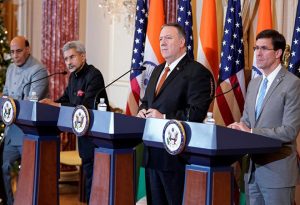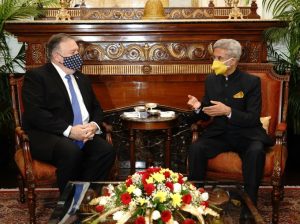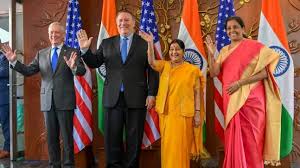
Barely a week before the American people elect their president, India and the US are set to deepen their strategic embrace by signing the last of the key defence foundational agreements at the 2+2 dialogue in the Indian capital on October 27.
When External Affairs Minister S. Jaishankar and Defence Minister Rajnath Singh sit down for wide-ranging talks with US Secretary of State Mike Pompeo and Defence Secretary Mark Esper in New Delhi, it will be time for stock-taking and a bit of preening at the results accomplished so far. The dialogue, both sides hope, will consolidate and reinforce the template for steering ties onto a higher trajectory that will hold regardless of who is in the White House.

The symbolism of holding the crucial 2+2 talks in the last week before the November 2020 elections will not be lost on those who have been tracking the India-US relations closely. It’s possible that President Donald Trump, who looks set to go if latest polls are anything to go by, wants to leave his legacy on the broad canvas of the India-US relations that registered significant milestones during his term. Secondly, although it’s not clear whether the 2+2 format will survive a change of presidency, one can safely say that the robust institutional framework of the India-US partnership will endure regardless of whether the Democrats or Republicans win the election.
Upswing in Defence Ties

Going by the past two editions of the 2+2 Dialogue which saw the signing of a key foundational defence pact, this time also the two countries are expected to sign BECA, the fourth and last of the foundational pacts. The Basic Exchange and Cooperation Agreement (BECA) will enable India to harness US expertise on geospatial intelligence and help the Indian military get better accuracy of its weapon systems. With the India-India border standoff showing no sign of easing, the BECA could come in handy for India it could help the Indian armed forces to have access to the US satellite image and sensory data.
The formal signing of BECA will cap the process of closer strategic intertwining of India and the US, and will pave the way for upscaling defence partnership to another level during the next presidency.
India has already signed the General Security of Military Information Agreement (GSOMIA), Logistics Exchange Memorandum Agreement (LEMOA) and the Communications and Information Security Agreement (CISMOA).
The burgeoning defence ties – the showpiece of the Trump legacy as far as the India-US relations are concerned – will be further cemented by the likely signing of a pact on defence intelligence sharing and another pact on maritime information sharing.
The two sides are also expected to flesh out proactive and expanded collaboration on forging a cooperation architecture to shape a free and open Indo-Pacific, which has emerged as the centrepiece of strategic engagement between the world’s largest democracies. Against the backdrop of the India-China border stalemate and Beijing’s perceived abrasiveness, enhanced India-US collaboration in the Indo-Pacific and within the framework of the Quad will have an added resonance.
The 2+2 dialogue, in short, will pass on a substantive template of India-US partnership to the next occupant of the White House. US President Donald Trump and his Democratic challenger, and probable successor, Joe Biden, could differ on may things, but if there is one passion they share, it is their belief in developing stronger relations with India, which is not only in the interests of India and the US, but also in the interests of the world. It may be the last 2+2 dialogue in the dying days of the Trump presidency, but in terms of outcomes, it could possibly add up to more than 4.
Author Profile

- Manish Chand is Founder and Editor-in-Chief of India Writes Network (www.indiawrites.org) and India and World, a pioneering magazine focused on international affairs. He is CEO, Centre for Global India Insights, an India-based think tank focused on global affairs.
Latest entries
 India and the WorldFebruary 27, 2026Modi visit: India-Israel partnership enters a new era
India and the WorldFebruary 27, 2026Modi visit: India-Israel partnership enters a new era India and the WorldFebruary 24, 2026Unravelling Modi’s Israel journey: What to expect
India and the WorldFebruary 24, 2026Unravelling Modi’s Israel journey: What to expect India and the WorldFebruary 17, 2026South-by-South: Focus on people-centric solutions at India AI summit
India and the WorldFebruary 17, 2026South-by-South: Focus on people-centric solutions at India AI summit India and the WorldFebruary 7, 2026Modi hails interim India-US trade deal, Goyal says no concessions made on agriculture
India and the WorldFebruary 7, 2026Modi hails interim India-US trade deal, Goyal says no concessions made on agriculture







